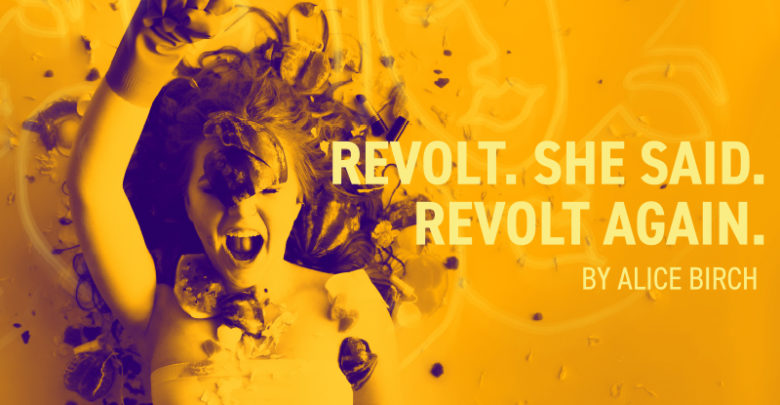Theatre Review: Revolt. She Said. Revolt Again.
Revolt. She Said. Revolt Again. is a radical act of public mourning for a revolution that may be impossible
 https://www.ualberta.ca/arts/shows/theatre-listings/revolt
https://www.ualberta.ca/arts/shows/theatre-listings/revoltWhere: Timms Centre for the Arts
When: November 29 — December 7
Creators: Alice Birch
Directors: Suzie Martin
Cast: Christina Nguyen, Kaeley Jade Wiebe, Meegan Sweet, Holly Wandler and Kael Wynn
Alice Birch’s Revolt. She Said. Revolt Again., directed by Suzie Martin, is a jarring, gutting testimony to what women do to survive living in a world that has never been built for them. Following a series of increasingly-abstract vignettes, the play revolutionizes language, work, and the body by unravelling the typical narrative structure of theatre in favour of raw emotion and action.
A woman inverts the language of sex by “fucking” her date with her “magnificent vagina.” A woman rejects the principle of a marriage that would turn her into chattel property. A woman asks for Mondays off. A woman masturbates in a supermarket. A woman, begging to be recognized, introduces her daughter to her mother. Two women cut out their tongues.
The play is relentless: for every moment of comedy, there is an equally tragic dark turn. Kael Wynn and Meegan Sweet are hilarious caricatures of corporate “teamwork” in one vignette that quickly turns into the play’s most gutting moment as Kaeley Wiebe cries, “you cannot rape me because I choose it.” Behind her, a banner reads, ominously: “Revolutionize the body. Make it sexually available constantly.”
With a cast of only five people, Martin’s direction gives each performer a chance to shine. Wandler’s horror as her daughter and mother cut out their tongues, Nguyen’s frustration as her boss refuses to understand why she wants Mondays off (“I want to walk my dog more in the woods”), Wynn’s fantasy of a perfect woman, Sweet’s heaviness and air of tragedy as she silently plants a row of potatoes, Wiebe’s mourning of a body made available so it can never be violated — all sit heavily with the audience, and all ground a script which could easily seem nonsensical in less capable hands.
Set and lighting designer, Jeremy Gordaneer, displays a sensitive understanding of Revolt’s depth.
Towards its end, the play presents the audience with a revolutionary feminist movement that’s falling apart. Quiet voices suggest that we “eliminate all men,” but as revolutionary banners fall heavily from the rafters, Birch suggests that revolution may be impossible. And if we cannot revolt, suddenly, several of the play’s moments become more understandable. In a world where exploitative work is unavoidable, suddenly Wiebe’s comical insistence on installing spa days, happy hour, an in-office swimming pool, and other nonsensical things that “women love!” is not the tactic of an out-of-touch executive, but a survival mechanism for a woman caught in a corporate world that effectively owns not only her subordinates, but her as well.
Offering no answers for the many disturbing questions it raises, Revolt. She Said. Revolt Again. is not, as it first appears, a manifesto, but a radical act of public mourning. “Who knew that life could be so awful,” a voice asks in the dark and the silence. The women in the audience understand: we knew.




